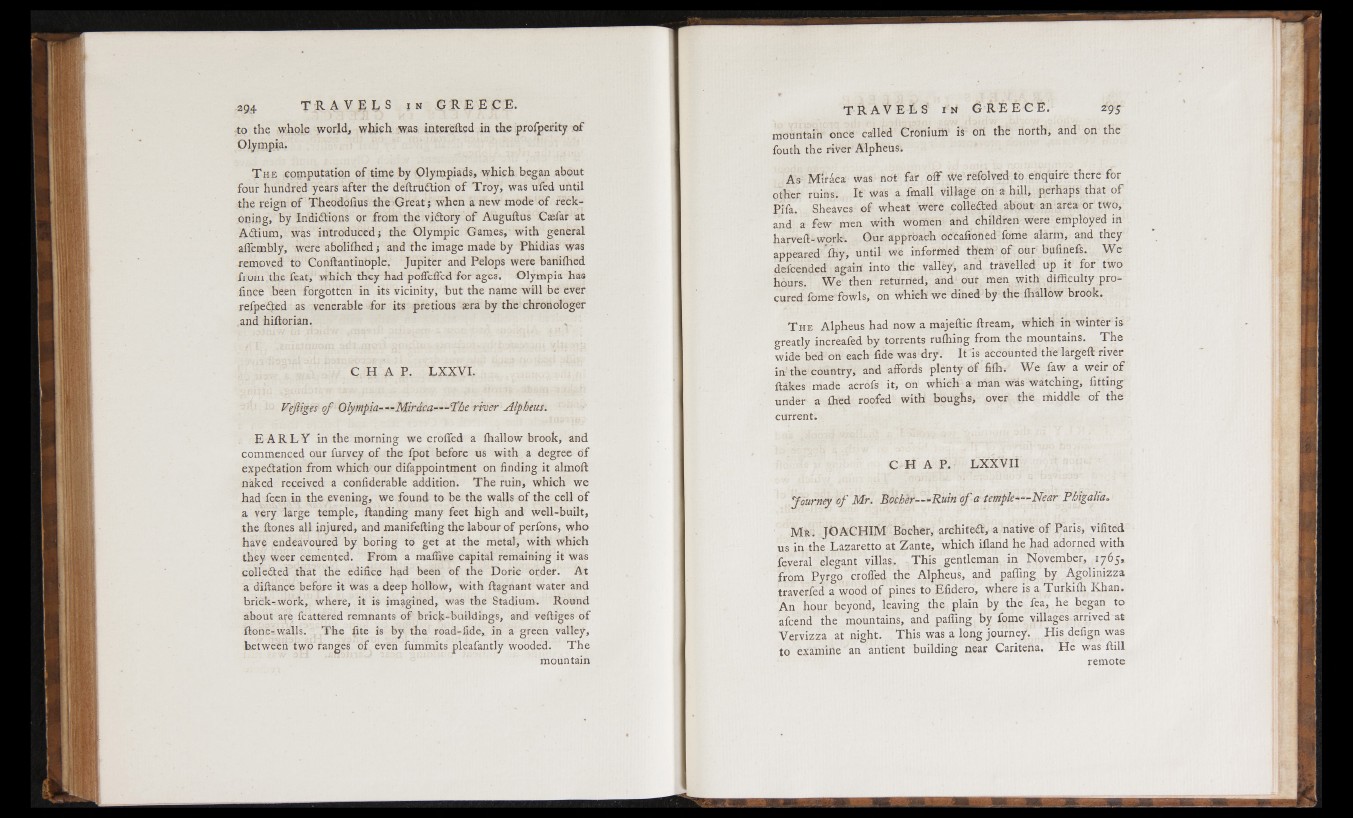
294 T ;R 4 V I L S i n © R E E C ,E.
;tq the s$*ole worlds whioh was, ioterefted in the /profpetity ia£
Olynr^pia.
T ub tCopiputatiQd of time by Olympiads, which; began about
four hundred years5 iafief the deftruCtion of Troy, was ufed until
jtbe r.eign o f Thebdbfius the ©neat j when a new mode of fick -
oning, by fndiCtions qr from the victory of Auguftus Caefar at
ACtiu.m, was introduced j the Olympic Games,' with general
aflembly, were abolished j and the image made by Phidias was
removed tb Conftantinbple. Jupiter and Pelops were banifhed
from,the feat, which they had poffeffed for ages. Olympia has
hnne been forgotten in its vicinity, hut the name will he ever
refpedjed as venerable for its peetious sera by the cferotiologer
,and faiftorian.
, c j A p. lxxyl
- Weffigfs1 o f ïQfyrnpia-*.-Mi.rêfia~-*JPbe rimer Alpheus. I
E A R L Y in the morning we croffed a fhallow brook, and
commenced our furvey of the fpot before us with a degree of
expectation from wbficbuaur difappointment on finding f t alpioft'
naked received a eonfiderable addition. The ruin, which we
had feen in the evening, we found to be the walls of the cell of
a very large temple, ftanding many feet high and well-built,
the ftones all injured, and manifefting the labour o f perfons, who
have endeavoured by boring to get at the metal, with which
they weer cemented. From a maffive capital remaining it was
colleâed that the edifice had been o f the Doric order. At
a diftance before it was a deep hollb-w, with ffagnant water and
brick-^wbrk, where, it is imagined, wat the Stadium. Round
about are Scattered remnants o f brick-buildings, and veft-iges bf
fionè-walls. ; The fite is by the road-fide* in a green valley,
hetwéên two ranges of even fumiiuts pleafantly wooded. The
* mountain
TRA V E E S ’ m ©REÉCE. m t
mobtitaih obce called ©fbriium1 ii" ofi thd hofthy and' oh the
fouth the river AlphehSi
As Mtfaea^ Was- not/ far off i^hquife-' thereffbr
other ruins. It was a findll village: dri a hill, perhaps that o f
Pifii. , Sheaves - of wheat were collected about- an-area or' tWoy
and a few' men with women5 ahd children were employed in
harvteff^wovk-. Our apprbach oCCafionedfome alarm, and they
appeared "ffiy, until we informed them - o fuohr: bufineft. W e
defeended again into thevalleyy and travelled up it for two
hoars. We then returned, and5 oiff men with diffieulty procured
fomefbwls, on Which' we dined ;by the fhallow brook.
T he Alpheus had now a majeftic ftream, which! in winter is
greatly increased by torrents rufliing from the mountains. The
wide bed-oh each fide w a s try . lt 'is ;aeeounted'the'largeff river
iff the country, and -affords plenty of filths We faw a weir o f
ftifees made aerofs it* on
under a fhfed roofed: with boughs, over the middle of the
current.
C H A P. LXXVli
Journey o f Mr. ^ W —^Rum Pljfeaiia.
MJt. JOACHIM Bbcher, architect,/ a native of ^aris> vifited
us in.the Lazaretto at Zante, which ifland he had( adorned with
feveral elegant villas, - This gentlemm in '^ v ^ b e | : , ^1765,
from Pyrgo croffed the Alpheus, and’ paffijig. by jyb lin iz za
traversed a wqod o f pines to.Efiderby where is a Turkilh.Khan.
Ah! hour . Beyond, leaving', ,the’;'pMn, jM to
afeerid the mountains, and palling by '^ e^ ^ ijia le^ ^ v a L a *
Vervizza at niglit. ,‘This was a long journey.^r His.defign was
to e#'mifte"an antient building riear Caritefia. He was ftill
remote